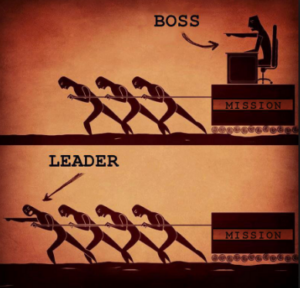What skill matters most if you are a leader of a small business? Or perhaps for any business leader? We agree with John Maxwell’s motivational leadership traits. The most critical is the ability to motivate.
For a small business, to develop the best qualities in creating a motivational leader is more critical to the daily operations.
Why? Because there is much less leadership to be involved. And fewer employees so you need everyone fully engaged and motivated.

The key to successful leadership today is INFLUENCE, not AUTHORITY.
– Ken Blanchard
So … you need to pay attention to the development of your motivational leadership abilities if you are a leader of a small business.
Here are some of John Maxwell’s important motivational leader qualities for your thinking and improving your ability to influence. Do you, as a business leader:
John Maxwell’s motivational leadership traits … put people first
People should always come first, they are your business. No matter what the job is, leaders always want to look for the best people and then take care of them. They are the lifeblood of the business.
When you’re leading a business or an organization, you’re leading people. Many leaders work to have relationships with their employees. Taking them out for coffee and getting to know them better is common, an important element of being a leader. Here are two additional perspectives from exceptional business leaders:
You can design and create, and build the most wonderful place in the world. But it takes people to make the dream a reality.
– Walt Disney
You have to treat your employees like customers.
Herb Kelleher
John Maxwell’s motivational leadership traits … develop strengths

Focus on recognizing and developing the strengths of your people. Build on strengths … work on weaknesses.
Some companies follow the motto: “hire for character, train for skill.” You hire people that are eager to learn and are very “raw.”
They don’t have a ton of skills; but as a leader, you teach them, and they become better. They grow with your company and contribute to its success.
You see this with football coaches. In football coaching, it’s almost unheard of for someone with no experience to be hired as the head coach of a team.
Most people start in a low-level position and gradually move up.
The same occurs in business. George Bodenheimer is the former president of ESPN. He started out working in the mailroom of ESPN.
It would have been very difficult for him to rise to the presidency if he hadn’t had a boss who wanted to help him grow and succeed in the company.
If you’re a leader, help your employees grow. You might have a great employee waiting to be a star, but if you don’t help them grow, you’ll never see it.
Worse, they might leave the company to go to an employer who will help them grow.
…effective executives do not start out by looking at weaknesses. You cannot build performance on weaknesses. You can build only on strengths. Make weaknesses irrelevant.
– Peter Drucker
John Maxwell’s motivational leadership traits … develop self-esteem by mentoring
Mentor and develop self-esteem and a positive attitude. We have written on employees’ positive attitude on several occasions.
Employee attitude is so critical that it can’t be overemphasized. It often trickles down from leaders, but it needs to happen more by design. Your business can never be what it can be if you don’t focus on employee happiness.
If you’re an entrepreneur, you’ll have dozens of people criticize you. Customers, current and former employees (whether you know it or not), and family and friends may give you constructive criticism.
It can be stressful to hear or read, and it can be easy to pass on criticism to employees. But it doesn’t help that much. As a leader, you should ensure employees have high self-esteem in their job.
Leaders should make employees feel good about themselves. Constantly criticizing and pointing out the flaws in an employee is a sure fire way to decrease morale and performance.
Improve Employee Motivation: How to Completely Change Techniques
John Maxwell’s motivational leadership traits … listen and observe
Listen, hear, and observe closely. Find the unspoken messages. Make listening and observing your core competencies.
You don’t gain insights by talking. Ideas can come from anywhere, so it’s important to keep your ears open to new ideas and insight.
Leaders need to be good listeners for everyone, from customers to employees to business colleagues. They need to listen to what other people say and not just hear it.
Listening also helps a leader to get multiple perspectives. When making a decision, a good leader always listens to some different people. They know they own the final decision but always make sure they get input from multiple people.
It was much later that I realized Dad’s secret. He gained respect by giving it. He talked and listened to the fourth-grade kids in Spring Valley who shined shoes the same way he talked and listened to a bishop or a college president.
He was seriously interested in who you were and what you had to say.
Sara Lawrence-Lightfoot, Respect
Be a connector

Be social … walk around and connect on multiple levels. Connected leaders quickly become multiplier leaders.
Multiplier leaders know that at the apex of the intelligence hierarchy is not the lone genius, but rather the leader who knows the importance of bringing out the smarts and capabilities in everyone around them.
We love to use this quote from Marty Kohr, as it is key to being a connected, multiplier leader:
The key is to be part of people’s lives. People will always prefer to do business with friends.
John Maxwell’s motivational leadership traits … inspire and energize
Share your passion. Show compassion and share positive energy always.
A quality of great leaders can articulate ideas and get people excited and inspired by them. It’s not selling people on an idea; it’s inspiring them.
Getting a person to work with a leader when they’re not obligated is more than just inspiring them. It’s about ensuring people have fun and are energized with passion.
Many charities get people to volunteer for them by inspiring and energizing a noble cause. They say that if you donate, you’ll be spending your time working toward something greater than yourself.
This inspires people to take a few hours to work for a charity promoting a cause they believe in.
People want to be part of something larger than themselves. They want to be part of something they’re proud of, that they’ll fight for, sacrifice for, trust.
–Howard Schultz, Starbucks
John Maxwell’s motivational leadership traits … problem solver
Be a problem solver. Resolve issues before they become problems.
Let people know you care about their problems enough to clear them out of the way.
Have balance
Your job is just a part of your life. It is not your life.
There is much more to life than work … find things you love outside of work. Find a balance that works for you and then show it works to your people.
Follow these tips, and you will be well on your way to becoming a more motivational leader.
Here is the bottom line
Our favorite motivational leader of all time? There would be many we like and studied. But our favorite would be Abraham Lincoln.
He worked to achieve mastery of law and politics. He gave his toughest rivals power and autonomy. In fact, he surrounded himself with rivals who excelled in areas where he was not strong.
He gave credit where it was due and wasn’t afraid to accept the blame. He genuinely sought out and listened to other people’s point of view.
His motivational leadership style was rooted in two higher goals: freeing the slaves and keeping the nation intact. Big motivators for most Americans, yes?
Who would be your example of the best motivational leader? Any questions or comments, please add them below.

So what’s the conclusion? The conclusion is there is no conclusion. There is only the next step. And that next step is completely up to you.
It’s up to you to keep improving your continuous learning. Lessons are all around you. In many situations, your competitor may be providing the ideas and or inspiration. But the key is in knowing that it is within you already.
All you get is what you bring to the fight. And that fight gets better every day you learn and apply new lessons.
When things go wrong, what’s most important is your next step.
Try. Learn. Improve. Repeat.
Are you devoting enough energy to improving your continuous learning for yourself and your team?
Do you have a lesson about making your continuous learning better you can share with this community? Have any questions or comments to add to the section below?
Digital Spark Marketing will stretch your thinking and your ability to adapt to change. We also provide some fun and inspiration along the way. Call us for a free quote today. You will be amazed at how reasonable we will be.
More reading on continuous learning from Digital Spark Marketing’s Library:
Build an Effective Team by Being a Talent Hound
Success Enablers of Highly Creative Leaders
Secrets to Becoming a Remarkably Mindful Leader
| Leadership Characteristics That Improve Influence |
Mike Schoultz is a digital marketing and customer service expert. With 48 years of business experience, he consults on and writes about topics to help improve the performance of a small business. Find him on G+, Facebook, Twitter, Digital Spark Marketing, Pinterest, and LinkedIn.